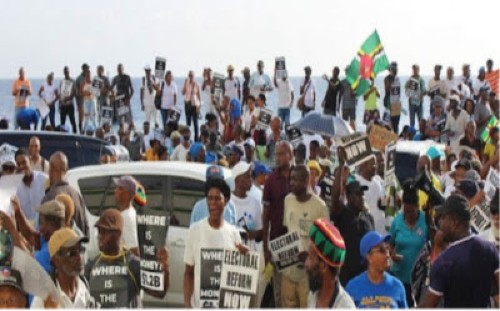ROSEAU, Dominica – The Electoral Reform Coalition (ERC) is calling for a jail term of no less than two years for anyone convicted of bribery or treating in order to secure the vote of anyone during a general election in Dominica.
 Public attend the ERC rally on Sunday (Photo courtesy Dominica News one Line)The ERC on Sunday called for the implementation of recommendations that it claimed have been omitted from draft legislation the government has released as it moves ahead with its efforts to bring to Parliament before yearend, proposed electoral modernisation legislation as part of the electoral reform process in Dominica.
Public attend the ERC rally on Sunday (Photo courtesy Dominica News one Line)The ERC on Sunday called for the implementation of recommendations that it claimed have been omitted from draft legislation the government has released as it moves ahead with its efforts to bring to Parliament before yearend, proposed electoral modernisation legislation as part of the electoral reform process in Dominica.
In June last year, the former president of the Trinidad-based Caribbean Court of Justice (CCJ), Sir Dennis Byron, submitted a report on electoral reform to the Dominica government.
Sir Dennis had been the sole commissioner advancing the efforts towards electoral reform, a major issue here with the opposition parties, the United Workers Party (UWP) and the Dominica Freedom Party (DFP) boycotting the last general election.
The boycott led to the ruling Dominica Labour Party (DLP) securing 19 of the 21 seats, with the remainder going to independent candidates.
“With respect to the offence of bribery…it must provide for the avoidance of doubt that the payment or promise to pay to a voter or his travelling expenses on the condition, expressed or implied that he will vote for a particular candidate is bribery and here must be a compulsory prison term of not less than two years for bribery, treating and undue influence campaign finance regulation,” said the ERC executive member, Pastor Randy Rodney.
“One of the best pieces of law that Dennis Byron wrote, we want that back. We want to know where the money come from and who gave you the money because we understand that people buying election those days to get what they want.
“We recommend provisions to strictly to prohibit public officers, the resources of the state an projects resulting from the expenditure of public funds as campaign tools to corruptly, improperly and unduly influence voters and thereby gain political advantage”.
The religious leader said also there should be access to the public funded media in Dominica by all political parties and independent candidates contesting an election.
“The House of Assembly Election bill must provide for access to all media for all political parties and that all public media houses, print, radio, television, digital and electronic are prohibited from denying any political party or candidate paid time and or space for the broadcast or publication of their messages,” he added.
The ERC said that among the recommendations made by Sir Dennis Byron to have been inexplicably deleted from the draft legislation, include provisions related to campaign financing and that the draft legislation fails to adequately address residency, voter identification, and reregistration requirements.
Pastor Randy said that the new legislation must ensure that only persons who are “ordinarily resident in Dominica should be eligible to vote in elections in Dominica” and also that ‘every eligible voter shall be issued a voter’s identification card produced by the Electoral Commission and will contain photographs, fingerprints, ID number, voter registration number, polling district, voter name and address”,
He said the security features on the card cannot be at the discretion of the chief registering officer “and must be a requirement in the law”.
He said the process of the registration and reconfirmation of voters “shall only be conducted in Dominica within a three-month period…”
In May, the government said that it had provided the Electoral Commission (EC) with copies of the proposed electoral modernisation legislation and that the submission followed extensive public debates, discussions, written recommendations from individuals and entities, and prolonged government-initiated electoral reform consultation.
The government said that copies of the proposed legislation have also been provided to President Sylvanie Burton and will be subsequently published on the government website and on other media platforms for public review.
Copies will also be forwarded to the Organization of American States (OAS), the Organization of Eastern Caribbean States (OECS), the Caribbean Community (CARICOM), and the London-based Commonwealth Secretariat.
The proposed legislation provides for the Registration of Electors Act and Regulations 2024;
The House of Assembly (Elections) Act and Regulations 2024, which incorporates the House of Assembly (Election Petition) Rules 2024; and The Electoral Commission Act 2024.
“We intend to have this finalized in June so that all the necessary budgetary allocations can be made in the upcoming financial estimates to give the electoral commission not only the legislative mandate but also the financial resources required to advance the implementation of the electoral reform process,” Skerrit said upon the release of the documents.
The government said it is confident that the proposed drafts address the principal areas of immediate concern and will set Dominica on a firm path to a comprehensive modernization of the electoral process.


